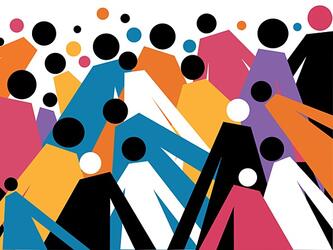The good citizen
Whatever you do, don’t mention the word ‘consumer’ around Jon Alexander. While the term is liberally used in any conversation involving marketers and market researchers, often just a lazy catch-all shorthand, for Alexander it is terminology that should be prohibited.
The reason for his absolutism is a moral argument twinned with a creative argument. “When you use the word ‘consumer’, you can’t help but think of people as having only one real line of agency – buying from you. Use the word ‘citizens’ and you immediately think of people as having multiple lines of agency to participate, co-create, challenge, build and more,” he explains.
“We think you can have a far more creative, generative society if we, the people, are allowed the space to think of ourselves as citizens, not just told we’re consumers constantly.”
So the choice of title for the organisation he founded – the New Citizenship Project – was carefully crafted. Its remit is to help “a more genuinely participatory society emerge – a society in which the primary role of the individual is the citizen, not just the consumer”.
For Alexander, setting up the project was the ultimate outcome of a gradual realisation that he wanted to do something different.
Career choices
He began his career as an account planner at advertising agency Abbott Mead Vickers BBDO and went on to lead Fallon’s social responsibility work among other advertising and marketing roles. But this career choice proved not to be what he had hoped. Like many before him, he found himself deeply disillusioned with the world of advertising. Unlike many before him, Alexander decided to do something about it. So was it daunting to step out of the world of advertising and go it alone with such an ambitious project?
“It was a relatively steady transition – the hard moment was leaving the ad industry in about 2010 – I went to work for the National Trust from there – so that was relatively safe, in that it was still a job,” he explains.
As an in-house brand strategist at the National Trust, he worked on several ideas. Among these were MyFarm – an online experiment in farming and food production where 10,000 members of the public could make decisions in running a real working farm – and a children and nature platform which included supporting Project Wild Thing to encourage children to reconnect with the natural world and launching its 50 things to do before you’re 11¾ list of outdoor adventure for families.
“After I spent about three years working at the Trust I felt like the work I’d done there had its own momentum and I wasn’t needed. I had a more balanced perspective so I was ready to start digging on the two questions I’ve been obsessed with for quite some time. The first is what are we doing when we’re telling ourselves we’re consumers constantly and what would it look like to bring all that creativity to participation,” explains Alexander.
Pondering these questions, hooking up with other like-minded people and getting a couple of early projects that fitted with his thinking, set Alexander down the path of establishing the project. But it was very much a case of just getting started.
“In terms of the journey I’ve been on – I’m a big believer in just start, take the first step and everything else follows.”
Society obsessions
But for something like the New Citizenship Project to take hold and grow, there needs to be a momentum and some degree of groundswell of support. So in a society seemingly obsessed with economic growth and fearful of anything that doesn’t lead to financial profit, is now the right time?
“We’re in a really interesting moment in time – I think the role of an individual in society shifts and changes over time. We’ve made the transition from subject to consumer through the 60s/70s/80s and now what’s happening is the era of the consumer is potentially coming to the end and the era of the citizen is emerging – there are all sorts of explanatory factors from political, economic, technological and rise of internet,” says Alexander.
“I’m a big believer in the [philosopher] Marshall McLuhan’s idea that the medium is the message. What he meant was that in any society the dominant medium in that society comes to shape the interactions in it. So, in a society dominated by television, you become a society of consumers because your mode of interaction with the TV is to choose what you watch but not to actively participate. It’s a one-to-many medium. In a society dominated by the internet it’s something very different – it’s potentially many-to-many, so the impact that the web has on broader societal interaction is really interesting.
“Are people ready? When I look around I think there are lots of interesting experiments taking hold all over the place but the dominant story is still that of the consumer,” he admits.
Marketing skill-sets
But is it acceptable to use the marketing and advertising skill-set – that very thing that drives consumption – toward a participatory goal?
“I don’t think an ends justifies the means – that logic could be applied if it was to get them to buy something different. In a way marketing becomes the wrong word for what we’re doing because it’s not about the market, it’s about the forum.
“Just think how much creativity and energy we put to getting people to that place, and then think about how much goes into getting people to participate and it’s fuck all. My thinking is more about creativity and inspiration – why should we treat participation as something inherently dull and boring?” says Alexander.
So the ultimate question is, how do you make people do it? For Alexander, it’s about rethinking people’s roles and adapting products or services accordingly.
“One of the things I worked on at the Trust that I’m most proud of is the early work around membership and re-framing it from a consumer product – such as a days out visitor pass – and starting to explore how membership is about an expression of values rather than just a purchase of value,” he explains.
Alexander is certainly aiming big with the New Citizenship Project. One of his heroes is Lord Young, politician, entrepreneur and social activist who wrote The Rise of the Meritocracy and helped establish institutions such as The Consumers’ Association, the Open University and the Open College of the Arts.
Iconic initiatives
“That’s what I dream of us becoming – to do for the citizen era what he did for the consumer era. So in two years’ time, I aspire to us catalysing the way of thinking among the broader population and other thought leaders and having created two or three really iconic initiatives that speak to the promise of this era,” says Alexander.
So for example, one of the things he’s currently working on is a co-operative business idea that’s a hack on the Airbnb model – trying to express an idea of what travel and tourism for citizens, rather than consumers, would look like – but with the aim of sustaining distinctive local cultures and economies.
“We are also working on an entry level civic participation platform that works a bit like Kickstarter but as a way for people to get involved in local communities. It’s about giving families something to do together in the holidays involved in the local community rather than about going shopping or to the cinema.”
So while Alexander insists he’s not an anti-capitalist, he does believe in a need to redesign the way society works.
“I believe in the role of the market in a healthy society. But I believe we must reclaim our moral agency in order to shape that market to work for us,” says Alexander.
21st Century People Power
The New Citizenship Project commissioned some YouGov research to test the hypothesis that “priming adults with questions that focused on them either as a ‘consumer’ or as a ‘citizen’ would impact on their responses to a series of questions on participation”.
It questioned a nationally representative survey of 3,597 British adults online with the sample split into three groups. One saw consumer priming statements before participation questions, the second saw citizen priming statements and the control group saw only the participation questions.
The ‘consumer’ primed group were asked whether they agreed with statements about brands, gadgets etc., while the ‘citizen’ priming questions focused on equality, the environment, friends and family. Following this, all three groups were shown questions on participation.
The outcome was that the ‘consumer’ group had the lowest net importance of participation scores while the ‘citizen’ group had the highest (the control group was in the middle).

We hope you enjoyed this article.
Research Live is published by MRS.
The Market Research Society (MRS) exists to promote and protect the research sector, showcasing how research delivers impact for businesses and government.
Members of MRS enjoy many benefits including tailoured policy guidance, discounts on training and conferences, and access to member-only content.
For example, there's an archive of winning case studies from over a decade of MRS Awards.
Find out more about the benefits of joining MRS here.














0 Comments